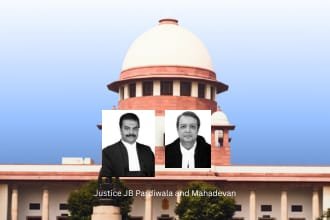The Supreme Court of India recently delivered a significant ruling wherein it set aside a conviction under the Protection of Children from Sexual Offences (POCSO) Act after observing that the relationship between the accused and the survivor was consensual and that the two were now happily married with a child. The judgment was pronounced by a Bench comprising Justice Dipankar Datta and Justice Augustine George Masih, who invoked the extraordinary powers under Article 142 of the Constitution to ensure complete justice in a case where strict application of the law would have caused irreversible harm to family life.
This ruling has sparked important conversations on the intersection of criminal law, consent, adolescent relationships, and rehabilitation, especially in cases involving romantic relationships between minors. It also highlights the Court’s evolving approach toward balancing legal mandates with human realities.
Background of the Case
The accused was initially convicted under:
- Section 366 IPC (Kidnapping, abducting or inducing a woman to compel her marriage), and
- Section 6 of the POCSO Act (Aggravated sexual assault).
The trial court sentenced him to 5 years imprisonment under IPC and 10 years under POCSO. The Madras High Court upheld his conviction in 2021. However, during the pendency of the appeal, the accused and the survivor—who was a minor at the time of the incident—got married in May 2021.
They also became parents to a male child, and the survivor expressed before the Court that she wished to continue her marital life peacefully and did not want her husband to be labeled a sexual offender.
TNSLSA Report: Welfare of Survivor Confirmed
As part of its compassionate and fact-based approach, the Supreme Court directed the Tamil Nadu State Legal Services Authority (TNSLSA) to verify the wellbeing of the survivor.
The report confirmed:
- The couple was living happily.
- The survivor was dependent on her husband.
- They had a young child, and the marriage was stable.
- The survivor did not want the prosecution to continue.
The survivor’s father, who was the original complainant, also stated that he had no objection to the criminal case being closed.
Supreme Court’s Key Observations
1. The Difference Between Predatory Assault and Consensual Adolescent Relationships
The Court emphasized that the offence did not stem from predatory intent, but rather from mutual affection:
“The crime was not the result of lust but love.”
This distinction is pivotal. While the POCSO Act is designed to protect minors, the Court recognized that not all cases involving minors represent sexual exploitation.
2. Justice Must Balance Law With Human Realities
The Court acknowledged that crime affects society, but also stressed:
“The administration of law is not divorced from practical realities.”
The purpose of criminal law is not solely to punish, but also to rehabilitate and restore harmony, where appropriate.
3. Use of Article 142 to Ensure Complete Justice
Despite the POCSO Act containing strict non-compoundable provisions, the Supreme Court held that in exceptional circumstances, it could invoke Article 142 to prevent injustice.
The Bench clarified that this decision was based on unique facts and should not be treated as a general precedent.
Condition Imposed on the Accused
To protect the interests of the survivor and the child, the Court directed:
- The accused must not desert his wife and child.
- He must maintain them with dignity throughout their lives.
- Failure to do so could result in unfavorable legal consequences.
This ensures that the compassionate relief does not endanger the survivor’s future.
Legal Significance of the Judgment
A. Expanding the Scope of Compassion in Criminal Justice
The ruling signals a shift from rigid punitive frameworks toward context-based adjudication. The Court emphasized that justice is not mechanical, but situational.
B. Challenges Regarding Consent Under POCSO
Under POCSO, consent of a minor is legally irrelevant. This judgment does not change that principle.
However, it acknowledges:
- Many cases arise out of romantic relationships, not sexual violence.
- Strict application of the law can sometimes destroy lives it aims to protect.
C. Reinforcing Article 142 as a Tool for Equitable Justice
The judgment reaffirms that Article 142 is a constitutional safety valve, allowing the Court to depart from strict law where necessary to prevent grave injustice.
Will This Case Act as a Precedent?
The Court made it explicit that:
“This decision is confined to the peculiar facts of this case.”
Therefore, it cannot be automatically applied to similar cases. Each case involving minors must be evaluated individually, especially where coercion, grooming, or exploitation may exist.
Conclusion
This Supreme Court judgment highlights the necessity of sensitivity and contextual understanding in cases involving young couples where consent and affection are present but legal frameworks classify the act as offense.
The ruling reiterates that law must serve justice—not the other way around.
By invoking Article 142, the Court sought to protect family harmony, ensure the welfare of the survivor and child, and prevent unnecessary social stigma.
However, the decision also underscores the importance of limiting its application to truly exceptional circumstances, ensuring that the protective intent of POCSO remains intact.
Also Read


